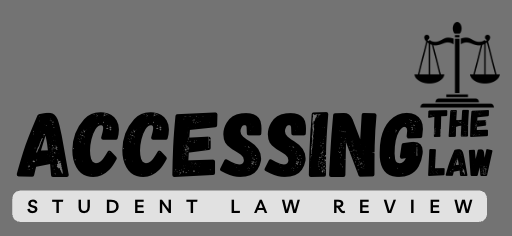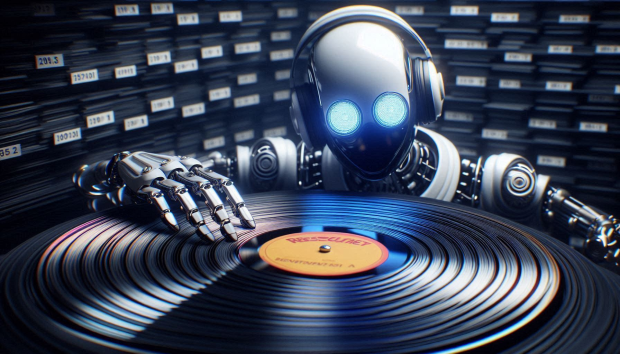Intellectual Property: The Big Three Record Labels v. AI Music Platforms
Written by Liv Moreno, Akhil Adusumilli, Marsela Shalabi
Edited by Anna Ramesh and Liv Moreno
Intellectual Property (IP) Law involves laws that protect and enforce the rights of creators and owners of inventions, writings, music, designs, and other works. There are different areas of IP such as copyright, patent, and trademark law. Intellectual property rights are important for consumers and ensure that they have access to the largest possible breadth of products and services. Without protections granted through intellectual property law, companies would be free to imitate and copy the work of others without consequence which could make companies less reliable, and harm creators with unique ideas but that lack the financial freedoms that large corporations have. Copyright infringement is common, thus safeguarding intellectual property rights is essential to prevent potential legal conflicts.
The Big Three record labels-Universal Music Group, Sony Music Entertainment, and Warner Music Group, filed a lawsuit against AI music platforms Suno and Udio, alleging copyright infringement. In the mid-2024 case, the Big Three alleged that the platforms had used thousands of copyrighted songs without permission to train AI models to be capable of generating music from text prompts. The record labels that own the copyrighted music argue that this use of its copyrighted works is illegal and uncompensated. They are seeking damages worth as much as $150,000 per infringed work, totaling in billions of dollars in compensation.
AI music generators, Suno and Udio, rely on datasets to train their models to follow their user's input. However, much of that data allegedly comes from copyrighted material. The legal question here is whether training AI on copyrighted works falls under infringement or "fair use." The Fair Use Doctrine is a legal principle in copyright law that allows limited use of copyrighted material without obtaining permission from the copyright holder, provided the use meets certain conditions. These conditions are intentionally broad so that things can be reviewed on a case-by-case basis. Unlike many other doctrines,the Fair Use Doctrine did not originate from a single act, bill, or case, but rather evolved through judicial decisions over time. In the case of Universal Sony and Warner v Suno and Udio, courts will decide if AI training falls under the conditions of the Fair Use Doctrine.
The lawsuit is currently in the discovery phase. Discovery is the process in where parties exchange information to be used by each party in developing their cases. This means documents, depositions, or other materials obtained that are relevant to ascertaining how the AI platforms trained their models, and whether or not copyrighted content was used without permission. Discovery serves as a vital process in clarifying case facts, equipping both parties with strategies to strengthen their positions and ensuring they are prepared for potential trial proceedings or settlement discussions.
A potential settlement in the case would see the platforms paying off the rights holders and changing the business practices, or the case could go to the courts to set a legal precedent on how copyright laws stand regarding AI-generated content. Similar cases involving the generators of AI images and text have similarly homed in on that gray area of training the AI and copyright.
It is part of a broader battle between advancing technology and the protection of intellectual property rights. In other sectors, companies like Anthropic and others have already reached settlements with publishers, agreeing to implement "guardrails" that restrict AI models from generating content that infringes on copyrighted material. These agreements reflect an industry-wide trend toward stricter controls over AI training and usage. In the music industry, the stakes are particularly high, as songs often hold deep cultural and economic value. The Big Three record labels, which dominate the global music market, have long relied on the legal system to protect their assets from piracy and unauthorized distribution. The current lawsuit underscores their determination to extend those protections to AI-generated content. The outcome of this case could not only reshape how AI platforms operate within the music industry but also establish a critical precedent for balancing technological innovation with the rights of creators across all forms of media.
Sony Music, Warner Music Group, and Universal Music Group are suing the AI music companies Suno and Udio for alleged copyright infringement regarding music owned by the labels. This isn't the first time Artificial Intelligence has been sued for something they didn't create. In 2023 a group of artistsincluding Sarah Andersen, Kelly McKernan, and Karla Ortiz filed a class action lawsuit against Stability AI, Midjourney, and DeviantArt in the Northern District of California. They are challenging the defendants' use of their artwork as training materials for an artificial intelligence software product called Stable Diffusion. Plaintiffs allege that Stable Diffusion has obtained billions of copyrighted images without permission, using them as "training images" for various visual generative AI platforms, including Stability's DreamStudio, DeviantArt's DreamUp, and Midjourney, Inc.'s Midjourney.
The ruling of this case was held by Judge William Orrick III, former judge of the United States District Court for the Northern District of California. On October 30, 2023, the district court primarily approved the defendants' motions to dismiss but permitted the direct infringement claims to proceed and granted the plaintiffs the opportunity to amend their case. A claim of induced copyright infringement against Stability AI was added by the plaintiffs, accusing the company of distributing its Stable Diffusion models. Judge Orrick noted that liability depends on how Stable Diffusion works and should be evaluated after discovery, distinguishing it from past cases that lacked evidence of intent to induce infringement. On August 12, 2024, the court granted the defendant's motions to dismiss the claims with prejudice but denied the motions for trademark, direct copyright infringement, and inducement claims.
The outcome of the case involving the "Big Three" record labels suing over alleged AI music infringement is likely to hinge on how courts interpret copyright law in the context of generative AI. If the plaintiffs successfully demonstrate that AI-generated music explicitly or substantially copies copyrighted works without authorization, the ruling could favor stricter enforcement of copyright protections against AI-generated content. This outcome would signal to developers of AI systems that training algorithms using copyrighted material without proper licensing constitutes infringement, setting a precedent that AI-generated works are not exempt from intellectual property laws. Conversely, if the defense argues persuasively that the AI's creations fall under fair use or are transformative enough to avoid infringement, it could open the door for broader freedoms in using copyrighted material to train AI models.
This case is poised to set a significant precedent for future cases involving AI and intellectual property. A ruling in favor of the record labels would likely push lawmakers to refine existing copyright laws to explicitly address the use of copyrighted materials in AI training and outputs. On the other hand, a decision favoring the defense could encourage more AI-driven innovation while putting pressure on industries to adapt their licensing frameworks to accommodate AI technologies. Either way, the ruling will become a benchmark for similar cases across sectors where generative AI interacts with protected content, such as literature, art, and film.
The case's outcome could significantly impact the trajectory of AI development and its integration into creative industries. A decision favoring stricter copyright enforcement might compel AI companies to invest heavily in obtaining licenses or developing datasets composed entirely of non-copyrighted materials. While this could benefit content creators by ensuring fair compensation, it might also stifle smaller AI developers who lack the resources to comply. Additionally, it could discourage the use of AI in creative endeavors, as creators may fear legal consequences for inadvertently replicating copyrighted material.
On the other hand, a ruling that leans toward leniency for AI developers could accelerate innovation in the music and broader creative industries. Artists and producers might increasingly use AI tools to enhance their work, potentially democratizing music production and enabling new forms of artistic expression. However, this could also lead to concerns about the devaluation of human creativity and the displacement of traditional roles within the industry. As AI-generated content becomes more widespread, companies will need to toe the line between fostering innovation and protecting the rights and livelihoods of original creators.
In the 2024 case, it was alleged that the platforms, Suno and Udio, had used thousands of copyrighted songs without permission to train AI models capable of generating music from text prompts. The music industry, or the Big Three (Universal Music Group, Sony Music Entertainment, and Warner Music Group) argues that this use of its copyrighted works is illegal and uncompensated.
The ruling in this lawsuit may reshape the relationship between AI and the creative industries. This will decide whether new technologies can legally use copyrighted content while training and may have global consequences as similar cases start to pop up all over the world. For now, the music and tech industries are waiting for legal clarity as they go through the discovery and early stages of this case to strike a balance between innovation and the rights of content creators that doesn't slight either side of the battle too harshly.
Work Cited
Deel, Dr. G. L. (2023, July 13). What is intellectual property law? and why does it matter?: American Public University. APU. https://www.apu.apus.edu/area-of-study/security-and-global-studies/resources/what-is-intellectual-property-law/
Dickstein, T., & Delman, E. (2023, October 30). Andersen v. Stability Ai Ltd.. Loeb & Loeb LLP. https://www.loeb.com/en/insights/publications/2023/11/andersen-v-stability-ai-ltd
Hussain, S., & Shields, E. (2024, August 12). Andersen v. Stability Ai Ltd.. Loeb & Loeb LLP. https://www.loeb.com/en/insights/publications/2024/08/andersen-v-stability#:~:text=The%20court%20determined%20that%20because,(b)%20of%20the%20DMCA.
Madigan, K. (2024, November 12). Top takeaways from order in the Andersen v. stability ai copyright case. Copyright Alliance. https://copyrightalliance.org/andersen-v-stability-ai-copyright-case/
Nina Corcoran, Jazz Monroe. 2024. "Music Industry Groups Sue AI Companies for Stealing Artists' Work to Generate Music." Pitchfork. Pitchfork. June 25. https://pitchfork.com/news/music-industry-groups-sue-ai-companies-for-stealing-artists-work-to-generate-music/#:~:text=A%20music%20industry%20body%20has,train%20AI%20to%20generate%20music.
Thomas, Daniel. 2024. "Abba's Björn Ulvaeus Warns of AI Threat to Musicians' Revenues." Subscribe to Read. Financial Times. December 4. https://www.ft.com/content/40b28a25-eddc-4ac5-82f3-dac0128a187f.

